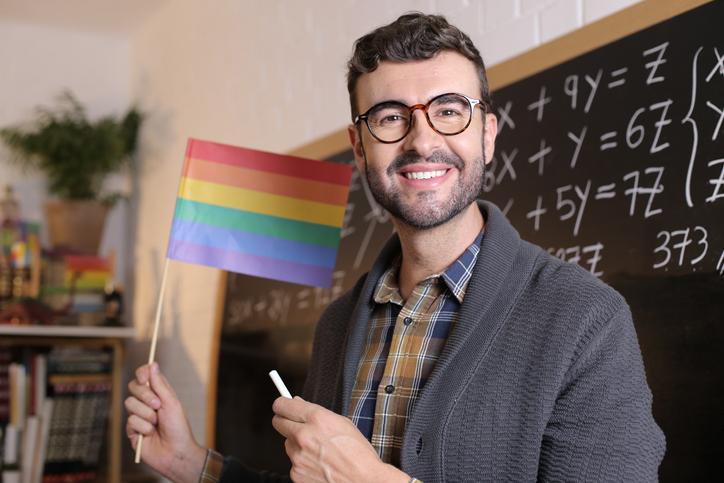Many US colleges and universities boast robust policies that ban discrimination on the basis of sexual orientation and gender identity, but members of the LGBTQ community remain under-represented among academic leaders. The small number of LGBTQ leaders on campuses leave LGBTQ faculty, staff and students feeling excluded and marginalised. Higher education needs to implement programmes to eliminate discrimination and prepare LGBTQ employees for leadership roles.
My path to leadership illustrates some of the challenges faced by aspiring LGBTQ leaders. In 2006, colleagues nominated me to serve as department chair. I had been a department member for nine years and had assembled a solid record of institutional service. I had never received formal mentoring for a leadership role, but colleagues persuaded me that I had demonstrated the ability to lead effectively and that I was ready to serve at that time.
Other members of the department nominated another candidate – a straight man who had been a department member for only three years. My opponent won the election and was appointed chair. After the election, one colleague told me that he voted for my opponent because he thought I would be too sensitive to withstand the criticism that I would face in making and implementing difficult decisions. I suspect that I lost the election because several of my colleagues harboured negative perceptions about members of the LGBTQ community.
- Subtle steps that make a big difference to LGBTQ+ inclusivity
- Leadership and the intersectionality of being queer and living with HIV
- Work ‘with’ not ‘on’: making social research more inclusive for LGBT+ people
Confronting isolation and exclusion
Five years later, I was elected department chair, and for more than a decade I have grown and advanced as a leader. Throughout this journey, however, I have often felt isolated and unsupported by other chairs and deans, provosts, chancellors and presidents. In my early years as a chair, there was only one other openly gay chair at my university, and there were no queer deans or vice-presidents to whom I could turn for advice or mentoring. My first mentoring session with an LGBTQ leader came after my sixth year as chair, at an LGBTQ Presidents (now LGBTQ Leaders in Higher Education) institute.
To reduce marginalisation and increase the number of LGBTQ leaders in higher education, colleges and universities need to develop and implement new policies, practices and programmes. Some academic leaders have taken decisive action to address systemic racism and sexism on campus. They must also confront the effects of systemic heterosexism and cis-sexism.
Advocates, allies and mentors
With support from a National Science Foundation ADVANCE grant, designed to increase the representation and advancement of women in the sciences and engineering, white male faculty at my current institution, Southern Illinois University Edwardsville, were trained to be advocates and allies for female faculty. These men learned how to intervene to disrupt discriminatory systems.
Straight faculty and administrators, particularly senior administrators, need to be similarly trained to be advocates and allies for LGBTQ faculty, staff and students. They need to be educated and to educate themselves about LGBTQ history and experiences and the many ways in which policies and practices have systematically excluded and silenced queer and transgender people in higher education. Then they can act to change these policies and practices and build more inclusive and equitable campus environments.
Advocates and allies who have educated themselves will appreciate how important it is to support LGBTQ employees and students. They will recognise the historic and cultural significance of the LGBTQ struggle for equality, and they should be present and visible at events such as Pride celebrations, rainbow graduations and National Coming Out Day. They should also be present at observations such as Transgender Day of Remembrance and World Aids Day, and they should release statements to make the entire campus aware of the significance of these commemorations.
Senior administrators need to support the professional development of LGBTQ leaders. Universities must provide mentoring for LGBTQ faculty and staff to prepare them for leadership roles. Since there are few senior LGBTQ leaders at most colleges and universities, much of this mentoring must occur beyond the campus. LGBTQ Leaders in Higher Education offers mentoring to participants in its leadership institutes, and some consulting firms, such as Academic Impressions and RSS Consulting, offer coaching by former college and university presidents.
Learning from other employers
Universities can learn from corporations and public employers that have successfully prepared LGBTQ employees for leadership roles. Many corporations provide mentoring, networking and professional development opportunities to their employees. Colleges and universities could offer leadership development workshops designed specifically for LGBTQ faculty and staff. They could invest in their leaders by supporting their participation in an LGBTQ Executive Leadership programme such as those offered through the Stanford Graduate School of Business and the Harvard Business School.
Finally, LGBTQ leaders need to be visible and make clear how their experiences with homophobia and transphobia have shaped them as leaders. I regularly remind faculty and staff members that my commitment to equity and inclusion in all processes grows out of my experiences of exclusion and marginalisation.
By educating themselves, advocating for and providing mentorship to aspiring LGBTQ leaders, straight faculty and administrators can make their colleges and universities more equitable and inclusive environments for LGBTQ students, staff and faculty.
Kevin Leonard is the dean of the College of Arts and Sciences, Southern Illinois University Edwardsville.
If you found this interesting and want advice and insight from academics and university staff delivered direct to your inbox each week, sign up for the Campus newsletter.




comment